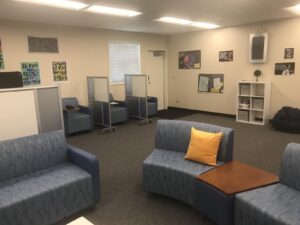Solano County Office of Education (SCOE) works hard to maximize behavioral health support to students in the county’s six independent school districts. Through a partnership with the county’s behavioral health department – which has been continuously expanded and strengthened over the past 11 years – SCOE has been able to support a variety of suicide prevention, mental health, and social emotional learning programs in school-based settings. Part of these initiatives include the implementation of bhworks, a web-based software program that provides tools for screening, triage, care management, and real-time analytics.
At SCOE, clinicians leverage the platform for a variety of programs and tasks, most of which begin with students completing a comprehensive behavioral health assessment. Using a tablet or mobile device, students answer questions about depression, anxiety, trauma, substance use, eating behaviors, bullying, abuse, suicidal ideation, gun access, and other risk factors. Responses are automatically scored, summarized, and ready for review by qualified staff. SCOE is currently using the platform to manage the behavioral health issues of students at the county’s community school sites, where students face higher risk for emotional problems, suicide ideation, and substance use issues.
Meredith Webb, Clinical Services Supervisor at SCOE, oversaw the implementation of bhworks at the agency and has been working to configure the platform for SCOE’s growing needs. For example, to make sure vulnerable students continue to receive vital support during the COVID-19 pandemic, Webb and her team quickly leveraged telehealth features in bhworks to enable remote screening, electronic consents, and virtual visits.
Webb also led the charge to add a battery of questions to identify students at risk for human trafficking at the county’s Golden Hills Community School. Though Webb acknowledges that many schools might be hesitant to ask these questions due to a lack of support resources within the system, she urges them to start screening anyway. “You have to screen to start seeing the numbers,” she explains. “You’re never going to get the funding if you don’t start collecting the data. I knew that there was a trafficking issue in our community. I could see it on the streets and on the internet, but it wasn’t until we started screening that I could show evidence that this was an issue that needed to be addressed in our student population.”
“You have to screen to start seeing the numbers. You’re never going to get the funding if you don’t start collecting the data.”

According to recent data from the California Healthy Kids Survey, Solano youth have rates of depression and suicide ideation that are higher than the state average. Webb points to these numbers as just one of the reasons SCOE wants to help schools add more programs and services that address mental health. This support includes leveraging BH-Works to serve all levels of need across Solano’s six districts. Ideally, she would like to see universal screening of students in all of the county’s K-12 schools, and SCOE has been working with the county’s behavioral health department to build the foundation for more comprehensive programming. Through funding provided through multiple entities, SCOE recently created a network of culturally responsive school Wellness Centers across twenty-five K-12 school sites. These Wellness Centers offer students a calm refuge whenever needed, tools for self-management, mindfulness meditation, group psycho-social counseling, and trauma support. The spaces are culturally and linguistically welcoming and accessible to all students.
Webb explains how these centers fit into her goal of expanding staff training and student support across Solano schools. “I see the Wellness Centers as an anchor for school-based prevention, intervention, and postvention efforts across the county,” she explains. “If we can leverage both this network and the BH-Works technology, we’ll be able to offer better support and services to our students.”
Ultimately, Webb sees this model as something that can be expanded across the state. “It’s our job to make sure these kids have everything they need to live good lives,” she states. “In order to do that, we have to identify and address their social and emotional needs as early as possible.”
About Solano County Office of Education
SCOE is a partner to Solano County’s 6 school districts, providing services and oversight that help them serve approximately 64,000 students. SCOE does not have or create policies directing district behavior, but does offer key services and programs including:
- – Service and support to help districts meet legal mandates, operate cost-effectively, and raise student achievement
- – Fiscal oversight to districts
- – Schools and services for special education and alternative education students who are not enrolled at district sites
- – College and Career Readiness and Workforce Development Services
- – Professional development for teachers and administrators.